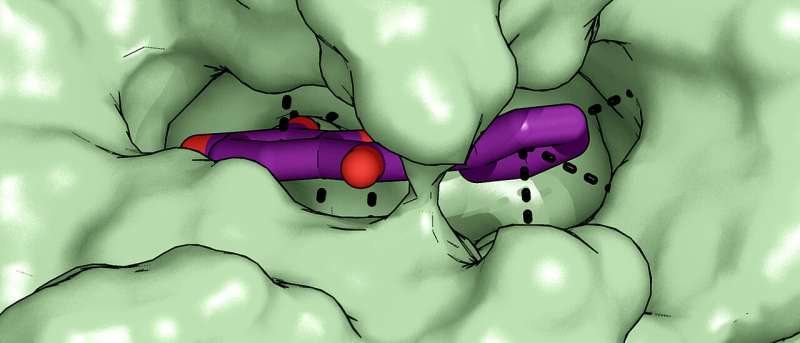This article has been reviewed according to Science X's editorial process and policies. Editors have highlighted the following attributes while ensuring the content's credibility:
fact-checked
peer-reviewed publication
trusted source
proofread
Vitamin B6: New compound could delay degradation

A low vitamin B6 level has negative effects on brain performance. A research team from Würzburg University Medicine has now found a way to delay the degradation of the vitamin.
Vitamin B6 is important for brain metabolism. Accordingly, in various mental illnesses, a low vitamin B6 level is associated with impaired memory and learning abilities, with a depressive mood, and even with genuine depression. In older people, too little vitamin B6 is linked to memory loss and dementia.
Although some of these observations were made decades ago, the exact role of vitamin B6 in mental illness is still largely unclear. What is clear, however, is that an increased intake of vitamin B6 alone, for example in the form of dietary supplements, is insufficient to prevent or treat disorders of brain function.
A research team from Würzburg University Medicine has now discovered another way to increase vitamin B6 levels in cells more effectively: namely by specifically inhibiting its intracellular degradation. Antje Gohla, Professor of Biochemical Pharmacology at the Department of Pharmacology and Toxicology at Julius-Maximilians-Universität Würzburg (JMU), is responsible for this.
Other participants come from the Rudolf Virchow Center for Integrative and Translational Bioimaging at JMU, the Leibniz-Forschungsinstitut für Molekulare Pharmakologie-FMP Berlin and the Institute for Clinical Neurobiology at Würzburg University Hospital. The team has now published the results of their investigations in the journal eLife.
Enzyme blockade improves learning ability
"We were already able to show in earlier studies that genetically switching off the vitamin B6-degrading enzyme pyridoxal phosphatase in mice improves the animals' spatial learning and memory capacity," explains Gohla. In order to investigate whether such effects can also be achieved by pharmacological agents, the scientists have now looked for substances that bind and inhibit pyridoxal phosphatase.
"In our experiments, we identified a natural substance that can inhibit pyridoxal phosphatase and thus slow down the degradation of vitamin B6," explains the pharmacologist. The working group was actually able to increase vitamin B6 levels in nerve cells that are involved in learning and memory processes. The name of this natural substance: 7,8-Dihydroxyflavone.
New approach for drug therapy
7,8-Dihydroxyflavone has already been described in numerous other scientific papers as a molecule that can improve learning and memory processes in disease models for mental disorders. The new knowledge of its effect as an inhibitor of pyridoxal phosphatase now opens up new explanations for the effectiveness of this substance. This could improve the mechanistic understanding of mental disorders and represent a new drug approach for the treatment of brain disorders, the scientists write in their study.
The team also considers it a great success that 7,8-Dihydroxyflavone has been identified as an inhibitor of pyridoxal phosphatase for the first time—after all, this class of enzymes is considered to be particularly challenging for drug development.
A long way to a drug
When will people benefit from this discovery? "It's too early to say," explains Marian Brenner, a first author of the study. However, there is much to suggest that it could be beneficial to use vitamin B6 in combination with inhibitors of pyridoxal phosphatase for various mental disorders and neurodegenerative diseases.
In a next step, Gohla and her team now want to develop improved substances that inhibit this enzyme precisely and highly effectively. Such inhibitors could then be used to specifically test whether increasing cellular vitamin B6 levels is helpful in mental or neurodegenerative diseases.
More information: Marian Brenner et al, 7,8-Dihydroxyflavone is a direct inhibitor of human and murine pyridoxal phosphatase, eLife (2024). DOI: 10.7554/eLife.93094.3
Journal information: eLife
Provided by Julius-Maximilians-Universität Würzburg


















